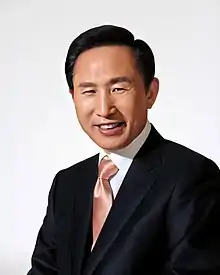Portal:South Korea
환영합니다! / Welcome To The South Korea Portal!South Korea, officially the Republic of Korea (ROK), is a country in East Asia. It constitutes the southern part of the Korean Peninsula and borders North Korea along the Korean Demilitarized Zone. The country's western border is formed by the Yellow Sea, and its eastern border is defined by the Sea of Japan. South Korea claims to be the sole legitimate government of the entire peninsula and adjacent islands. It has a population of 51.96 million, of which roughly half live in the Seoul Capital Area, the fourth most populous metropolitan area in the world. Other major cities include Incheon, Busan, and Daegu. The Korean Peninsula was inhabited as early as the Lower Paleolithic period. Its first kingdom was noted in Chinese records in the early 7th century BCE. Following the unification of the Three Kingdoms of Korea into Silla and Balhae in the late 7th century, Korea was ruled by the Goryeo dynasty (918–1392) and the Joseon dynasty (1392–1897). The succeeding Korean Empire (1897–1910) was annexed in 1910 into the Empire of Japan. Japanese rule ended following Japan's surrender in World War II, after which Korea was divided into two zones: a northern zone occupied by the Soviet Union, and a southern zone occupied by the United States. After negotiations on reunification failed, the southern zone became the Republic of Korea in August 1948, while the northern zone became the communist Democratic People's Republic of Korea the following month. In 1950, a North Korean invasion began the Korean War, which saw extensive American-led United Nations intervention in support of the South while China intervened to support the North with Soviet assistance. After the war's end in 1953, the country entered into a military alliance with the U.S., which continues to this date, and its devastated economy began to soar, recording the fastest rise in average GDP per capita in the world between 1980 and 1990. Despite lacking natural resources, the nation rapidly developed to become one of the Four Asian Tigers based on international trade and economic globalization, integrating itself within the world economy with export-oriented industrialization and currently being one of the largest exporting nations in the world, along with having one of the largest foreign exchange reserves in the world. The June Democratic Struggle led to the end of authoritarian rule in 1987, and the country is now considered among the most advanced democracies in Asia. (Full article...) Selected article -Ban Ki-moon (Korean: 반기문; Hanja: 潘基文 [pan.ɡi.mun]; born 13 June 1944) is a South Korean politician and diplomat who served as the eighth secretary-general of the United Nations between 2007 and 2016. Prior to his appointment as secretary-general, Ban was the South Korean Minister of Foreign Affairs and Trade between 2004 and 2006. Ban was initially considered to be a long shot for the office of Secretary-General of the United Nations; he began to campaign for the office in February 2006. As the foreign minister of South Korea, he was able to travel to all the countries on the United Nations Security Council, a maneuver that subsequently turned him into the campaign's front runner. On 13 October 2006, he was elected as the eighth secretary-general by the United Nations General Assembly. On 1 January 2007, he succeeded Kofi Annan. As secretary-general, he was responsible for several major reforms on peacekeeping and UN employment practices around the world. Diplomatically, Ban has taken particularly strong views on global warming, pressing the issue repeatedly with U.S. President George W. Bush, and on the Darfur conflict, where he helped persuade Sudanese president Omar al-Bashir to allow peacekeeping troops to enter Sudan. Ban was named the world's 32nd most powerful person by the Forbes list of The World's Most Powerful People in 2013, the highest among South Koreans. In 2014, he was named the third most powerful South Korean after Lee Kun-hee and Lee Jae-yong. In 2016, Foreign Policy named Ban one of the Top 100 Global Thinkers for his achievement of helping the Paris Agreement to be ratified and enforced less than a year after it was adopted. António Guterres was appointed by the General Assembly on 13 October 2016 to be the successor of Ban Ki-moon as he exited on 31 December 2016. He was widely considered to be a potential candidate for the 2017 South Korean presidential election, before announcing, on 1 February, that he would not be running. On 14 September 2017, Ban was elected chair of the International Olympic Committee's Ethics Commission. Also in 2017, Ban co-founded the nonprofit Ban Ki-moon Centre for Global Citizens. He also currently serves as the Distinguished Chair Professor at Yonsei University's Institute for Global Engagement and Empowerment. (Full article...)Selected image South Korean pop group Girls' Generation Girls' Generation (Korean: 소녀시대; RR: Sonyeo Sidae), also known as SNSD, is a South Korean girl group formed by SM Entertainment. Its nine original members were (pictured, from left to right): Taeyeon, Hyoyeon, Seohyun, Sooyoung, Yoona, Jessica, Tiffany, Sunny, and Yuri. Jessica later departed from the group in September 2014. More did you know -
In the news
|




















